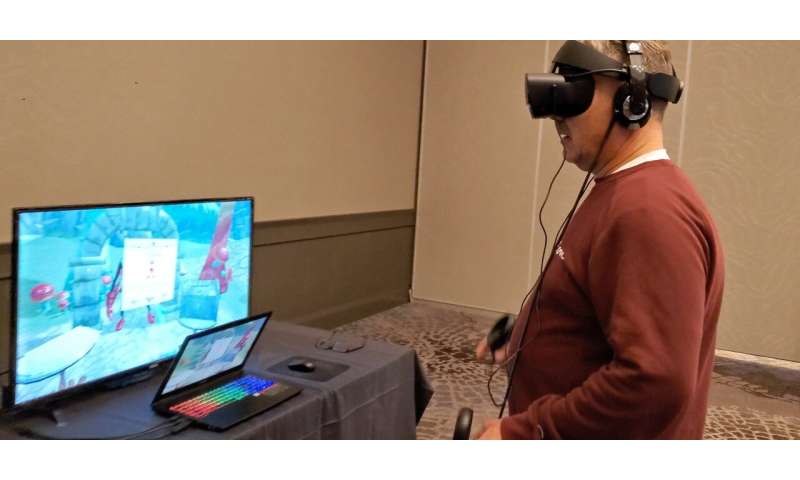
In a virtual world, a knight in full armour sits in front of me, expectantly waiting for me to deal them some playing cards. As the game progresses, a large black spot grows in the middle of my vision. I try to pick up the deck of cards from the table, but the spot is now so bad I can’t see the deck when I look directly at it. I fumble for the cards for a few moments, but my time runs out and the game ends.
The effect is unsettling—and that’s the point, says Karim Damji, chair of the University of Alberta’s Department of Ophthalmology and Visual Sciences and one of the game’s creators.
“A healthy person doesn’t necessarily understand the journey related to vision loss, but going through the experience can help them develop some empathy around it,” said Damji.
“It’s one thing to read about vision loss in a pamphlet or watch a video, but virtual reality gives people the chance to live through different types of vision loss.”
Developed by the ophthalmology department and Edmonton-based virtual/augmented reality production company KOVR, Through the Looking Glass is designed to give players an immersive experience of what people with vision loss go through if their eyes get progressively worse. Using a VR headset and controllers, players venture through a fantastical world based on Alice in Wonderland while performing a series of basic tasks, such as dealing cards to knights or arranging potions on a shelf, to progress the story.
As the game goes on, players experience one of three kinds of vision loss based on choices made at the beginning of the game: central vision loss, such as in macular degeneration or diabetic macular disease; peripheral vision loss, as with glaucoma; or a blurring with glare that can occur with age-related cataracts.
“These three problems capture a large number of the common causes of blindness and a few of the common genetic causes as well,” Damji said. “In the future we may add more patterns, or even the experience of vision recovery that can take place with appropriate therapeutic alternatives.”
For Damji, the potential of the game and other immersive experiences to help develop empathy for vision loss is important not just for patients, but also for family members who care for them and may also be at higher risk for developing vision loss of their own. He believes it could also be a valuable learning opportunity for health-care workers.
“A common perspective is, “My doctor doesn’t really understand what I’m talking about,” so in training doctors and technicians, this could be incorporated as a tool,” he said. “You need to understand to empathize with the patient, right? It’s all about the patient experience, and so far we haven’t had great tools to help people understand that journey. This provides a way of doing that.”
Source: Read Full Article



